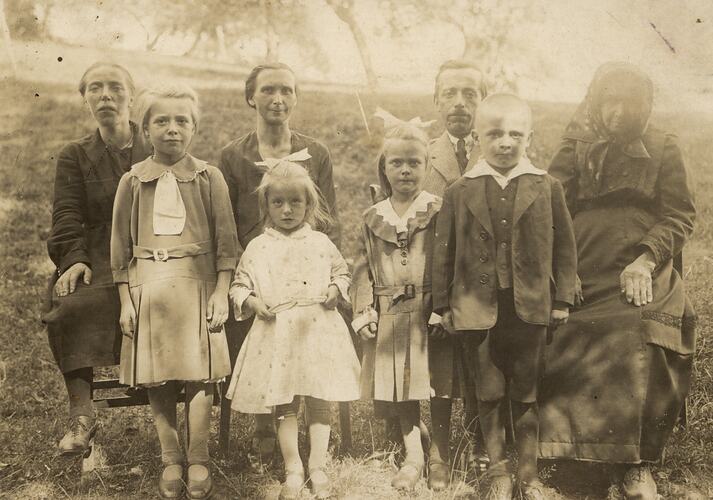Summary
Black and white photograph of a group of the Huber family, seated outside. Back row, from lefte to right: Auntie Mizzel, Grandmother (Dorothea's mother), Dorothea's father, Dorothea's father's mother. Front row, left to right: Cill (sister), Dorothea, Marioll (sister), Alois (brother).
Born in 1929 near Graz, Austria, Dorothea Dunzinger [formerly Huber and nee Freitag] was a proficient recreational skier and part of a volunteer rescue team in Switzerland. She lived and worked primarily as a mill weaver and seamstress in England, Switzerland and Austria before migrating to Australia from Austria on 30 November 1959, arriving on the Cogedar Line ship 'Flaminia' on 31 December. She settled in Melbourne and married fellow Austrian Johann Dunzinger whom she met at Broadmeadows migrant hostel. They had a daughter Caroline and lived in various Melbourne suburbs boarding and renting before building a home in Kalorama. The couple divorced in1978. Dorothea worked hard all her life, owning a boutique clothing shop in Camberwell at one stage but primarily as a textile outworker and factory worker trying to make ends meet. She died in 2001.
Description of Content
Family photograph taken in an outdoor setting, depicting three women and a man seated in a row across the back, with four children (three girls and one boy) standing in a row across the front. All are wearing formal clothing, their expressions are serious, and all are looking directly into the camera. Trees can be seen in the background.
Physical Description
Digital image
Significance
The Dunzinger Austrian Migrant Collection has evolved to become a rich group of objects which tell a particular story of an Austrian woman's post-war migration experiences, as well as broader contextual narratives relating to the variety of selection and management processes in place in Europe after World War II. These include references to Australian-specific organisations involved in migration management such as the Australian Migration Mission. Items explore the enthusiastic promotional activities of the Australian Government to encourage migration from the UK and Europe in order to populate Australia and build a workforce. Artefacts also relate to a significant Italian migrant ship of the period, the Cogedar Line 'Flotto Lauro'.
There is a also symbolic poignancy about the skis and the small sewing machine Dorothea Dunzinger brought with her from Austria: the skis representing precious mementoes from home and hopes and expectations for the leisure activity they might bring in Australia; the sewing machine a pragmatic object which came to dominate Dorothea's actual settled life of hard work both in the home and as an outworker with no leisure time at all.
More Information
-
Collecting Areas
Migration & Cultural Diversity, Transport, Images & Image Making
-
Acquisition Information
Donation from Ms Caroline Dunzinger, 07 Nov 2012
-
Person Depicted
-
Individuals Identified
Dorothea Huber; Huber Family
-
Format
Digital file, Black & White
-
Classification
-
Category
-
Discipline
-
Type of item
-
Keywords
Austrian Immigration, Shipboard Travel, Shipping Companies, Immigrant Shipping, Immigrant Voyages, Portraits, Domestic Life
